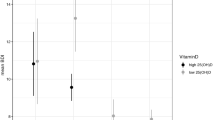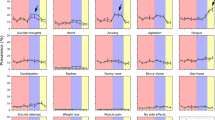Abstract
There is substantial inter-individual variation in response to antidepressants, and genetic variation may, in part, explain these differences. For example, there is evidence to suggest that variation in the serotonin transporter gene (SLC6A4) predicts response to selective serotonin reuptake inhibitors (SSRIs). Environmental factors such as the occurrence of stressful life events before treatment may also be important. One prior report suggests that both factors interact in predicting response to antidepressants. GENDEP, a prospective part-randomized pharmacogenomics trial, collected longitudinal data on the outcome of 811 patients with major depression undergoing treatment with either an SSRI (escitalopram) or a tricyclic antidepressant (nortriptyline). Life events experienced over 6 months preceding treatment were measured using a List of Threatening Experiences Questionnaire, and several polymorphisms in the serotonin transporter gene (SLC6A4) have been genotyped including the serotonin transporter-linked polymorphic region (5-HTTLPR). Stressful life events were shown to predict a significantly better response to escitalopram but had no effect on response to nortriptyline. Variation in the 5-HTTLPR and another polymorphism in the gene, STin4, significantly modified these effects. Gene–environment interactions including life events may therefore be important not only in the aetiology of depression, but also in predicting response to antidepressant medication.
This is a preview of subscription content, access via your institution
Access options
Subscribe to this journal
Receive 6 print issues and online access
$259.00 per year
only $43.17 per issue
Buy this article
- Purchase on Springer Link
- Instant access to full article PDF
Prices may be subject to local taxes which are calculated during checkout


Similar content being viewed by others
References
Trivedi MH, Rush AJ, Wisniewski SR, Nierenberg AA, Warden D, Ritz L et al. Evaluation of outcomes with citalopram for depression using measurement-based care in STAR*D: implications for clinical practice. Am J Psychiatry 2006; 163: 28–40.
Franchini L, Serretti A, Gasperini M, Smeraldi E . Familial concordance of fluvoxamine response as a tool for differentiating mood disorder pedigrees. J Psychiatr Res 1998; 32: 255–259.
Oreilly RL, Bogue L, Singh SM . Pharmacogenetic response to antidepressants in a multicase family with affective-disorder. Biol Psychiatry 1994; 36: 467–471.
Mazure CM, Bruce ML, Maciejewski PK, Jacobs SC . Adverse life events and cognitive-personality characteristics in the prediction of major depression and antidepressant response. Am J Psychiatry 2000; 157: 896–903.
Reno RM, Halaris AE . The relationship between life stress and depression in an endogenous sample. Compr Psychiatry 1990; 31: 25–33.
Brugha TS, Bebbington PE, Stretch DD, MacCarthy B, Wykes T . Predicting the short-term outcome of first episodes and recurrences of clinical depression: a prospective study of life events, difficulties, and social support networks. J Clin Psychiatry 1997; 58: 298–306.
Monroe SM, Thase ME, Hersen M, Himmelhoch JM, Bellack AS . Life events and the endogenous-nonendogenous distinction in the treatment and posttreatment course of depression. Compr Psychiatry 1985; 26: 175–186.
Bock C, Bukh JD, Vinberg M, Gether U, Kessing LV . Do stressful life events predict medical treatment outcome in first episode of depression? Soc Psychiatry Psychiatr Epidemiol 2009; 44: 752–760; e-pub ahead of print 5 February 2009.
Mandelli L, Marino E, Pirovano A, Calati R, Zanardi R, Colombo C et al. Interaction between SERTPR and stressful life events on response to antidepressant treatment. Eur Neuropsychopharmacol 2009; 19: 64–67.
Kim H, Lim SW, Kim S, Kim JW, Chang YH, Carroll BJ et al. Monoamine transporter gene polymorphisms and antidepressant response in Koreans with late-life depression. JAMA 2006; 296: 1609–1618.
Kirchheiner J, Grundemann D, Schomig E . Contribution of allelic variations in transporters to the phenotype of drug response. J Psychopharmacol 2006; 20: 27–32.
Rausch JL, Johnson ME, Fei YJ, Li JQ, Shendarkar N, Hobby HM et al. Initial conditions of serotonin transporter kinetics and genotype: influence on SSRI treatment trial outcome. Biol Psychiatry 2002; 51: 723–732.
Smeraldi E, Zanardi R, Benedetti F, Di BD, Perez J, Catalano M . Polymorphism within the promoter of the serotonin transporter gene and antidepressant efficacy of fluvoxamine. Mol Psychiatry 1998; 3: 508–511.
Zanardi R, Serretti A, Rossini D, Franchini L, Cusin C, Lattuada E et al. Factors affecting fluvoxamine antidepressant activity: influence of pindolol and 5-HTTLPR in delusional and nondelusional depression. Biol Psychiatry 2001; 50: 323–330.
Serretti A, Kato M, De RD, Kinoshita T . Meta-analysis of serotonin transporter gene promoter polymorphism (5-HTTLPR) association with selective serotonin reuptake inhibitor efficacy in depressed patients. Mol Psychiatry 2007; 12: 247–257.
Huezo-Diaz P, Uher R, Smith R, Rietschel M, Henigsberg N, Marusic A et al. Moderation of antidepressant response by the serotonin transporter gene in the GENDEP study. Br J Psychiatry 2009; 195: 30–38.
Mrazek DA, Rush AJ, Biernacka JM, O’Kane DJ, Cunningham JM, Wieben ED et al. SLC6A4 variation and citalopram response. Am J Med Genet B Neuropsychiatr Genet 2008; 150B: 341–351.
Caspi A, Sugden K, Moffitt TE, Taylor A, Craig IW, Harrington H et al. Influence of life stress on depression: moderation by a polymorphism in the 5-HTT gene. Science 2003; 301: 386–389.
Wilhelm K, Mitchell PB, Niven H, Finch A, Wedgwood L, Scimone A et al. Life events, first depression onset and the serotonin transporter gene. Br J Psychiatry 2006; 188: 210–215.
Uher R, McGuffin P . The moderation by the serotonin transporter gene of environmental adversity in the aetiology of mental illness: review and methodological analysis. Mol Psychiatry 2008; 13: 131–146.
Kilpatrick DG, Koenen KC, Ruggiero KJ, Acierno R, Galea S, Resnick HS et al. The serotonin transporter genotype and social support and moderation of posttraumatic stress disorder and depression in hurricane-exposed adults. Am J Psychiatry 2007; 164: 1693–1699.
Uher R, Maier W, Hauser J, Marusic A, Schmael C, Mors O et al. Differential efficacy of escitalopram and nortriptyline on dimensional measures of depression. Br J Psychiatry 2009; 194: 252–259.
Hu XZ, Lipsky RH, Zhu G, Akhtar LA, Taubman J, Greenberg BD et al. Serotonin transporter promoter gain-of-function genotypes are linked to obsessive-compulsive disorder. Am J Hum Genet 2006; 78: 815–826.
Wing JK, Sartorius N, Ustin TB . Diagnosis and Clinical Measurement in Psychiatry. a Reference Manual for SCAN. World Health Organization: Geneva, Switzerland, 1998.
Montgomery SA, Asberg M . A new depression scale designed to be sensitive to change. Br J Psychiatry 1979; 134: 382–389.
Hamilton M . Development of a rating scale for primary depressive illness. Br J Psychiatry 1967; 6: 278–296.
Beck AT, Mendelson M, Mock J, Erbaugh J . An inventory for measuring depression. Arch Gen Psychiatry 1961; 4: 561–571.
Uher R, Farmer A, Maier W, Rietschel M, Hauser J, Marusic A et al. Measuring depression: comparison and integration of three scales in the GENDEP study. Psychol Med 2008; 38: 289–300.
Brugha T, Bebbington P, Tennant C, Hurry J . The List of Threatening Experiences: a subset of 12 life event categories with considerable long-term contextual threat. Psychol Med 1985; 15: 189–194.
Farmer A, Breen G, Brewster S, Craddock N, Gill M, Korszun A et al. The Depression Network (DeNT) Study: methodology and sociodemographic characteristics of the first 470 affected sibling pairs from a large multi-site linkage genetic study. BMC Psychiatry 2004; 4: 42.
Gueorguieva R, Krystal JH . Move over ANOVA: progress in analyzing repeated-measures data and its reflection in papers published in the Archives of General Psychiatry. Arch Gen Psychiatry 2004; 61: 310–317.
StataCorp. Stata-statistical software: release 10. Stata Corp LP, College Station, Texas, 2007.
Buratti E, Baralle FE . Influence of RNA secondary structure on the pre-mRNA splicing process. Mol Cell Biol 2004; 24: 10505–10514.
MacKenzie A, Quinn J . A serotonin transporter gene intron 2 polymorphic region, correlated with affective disorders, has allele-dependent differential enhancer-like properties in the mouse embryo. Proc Natl Acad Sci USA 1999; 96: 15251–15255.
Uher R . The implications of gene-environment interactions in depression: will cause inform cure? Mol Psychiatry 2008; 13: 1070–1078.
Risch N, Herrell R, Lehner T, Liang KY, Eaves L, Hoh J et al. Interaction between the serotonin transporter gene (5-HTTLPR), stressful life events, and risk of depression: a meta-analysis. JAMA 2009; 301: 2462–2471.
Rutter M, Thapar A, Pickles A . Gene-environment interactions: biologically valid pathway or artifact? Arch Gen Psychiatry 2009; 61: 1287–1289.
Uher R, McGuffin P . The moderation by the serotonin transporter gene of environmental adversity in the etiology of depression: 2009 update. Mol Psychiatry 2009; 15: 18–22.
Rutter M, Pickles A . Person-environment interactions: concepts, mechanisms, and implications for data analysis. In: Wachs TD, Plomin R (eds). Conceptualization and Measurement of Organism-Environment Interaction. American Psychological Association: Washington DC, 1991. pp 105–141.
Acknowledgements
We acknowledge the contribution of the following collaborators: Helen Dean, Amanda Elkin, Joanna Gray, Cerisse Gunasinghe, Desmond Campbell, David Dempster, Richard J Williamson, Caterina Giovannini, Julien Mendlewicz, Thomas Schulze, Jana Strohmaier, Christine Schmäl, Susanne Höfels, Anna Schuhmacher, Ute Pfeiffer, Sandra Weber, Anne Schinkel Stamp, Piotr Czerski Alenka Tancic, Jerneja Sveticic, Zrnka Kovacic, Paweł Kapelski, Maria Skibińska, Aleksandra Rajewska, Aleksandra Szczepankiewicz and Elzbieta Cegielska. We specially acknowledge the contribution of Jorge Perez, who was the Principal Investigator at Brescia, Italy, and who passed away in October 2007, and the late Professor Andrej Marusic, who was the Lead Investigator at Ljubljana, and who passed away in June 2008. The GENDEP project was funded by the European Commission Framework 6 Grant, EC Contract Ref.: LSHB-CT-2003–503428. Lundbeck provided both nortriptyline and escitalopram free of charge for the GENDEP study. GlaxoSmithKline, the Medical Research Council, the Biomedical Research Center for Mental Health at the Institute of Psychiatry and South London and Maudsley NHS Foundation Trust (funded by the United Kingdom National Institute for Health Research of the Department of Health) contributed to the funding of the sample collection at the Institute of Psychiatry, London, through add-on projects or latterly staff funding. The sponsors had no role in the design and conduct of the study, in data collection, analysis, interpretation or writing the paper.
Author information
Authors and Affiliations
Corresponding author
Ethics declarations
Competing interests
Keers, Uher, Huezo-Diaz, Smith, Jaffee, Rietschel, Kozel, Mors, Maier, Hauser, Placentino, Zobel, Larsen, Czerski, Gupta, Hoda and Craig report no competing interests. Henigsberg and Souery participated in clinical trials sponsored by pharmaceutical companies including GlaxoSmithKline and Lundbeck. Aitchison, Farmer and McGuffin have received consultancy fees and honoraria for participating in expert panels from pharmaceutical companies including Lundbeck and GlaxoSmithKline.
Additional information
Supplementary Information accompanies the paper on the The Pharmacogenomics Journal website
Rights and permissions
About this article
Cite this article
Keers, R., Uher, R., Huezo-Diaz, P. et al. Interaction between serotonin transporter gene variants and life events predicts response to antidepressants in the GENDEP project. Pharmacogenomics J 11, 138–145 (2011). https://doi.org/10.1038/tpj.2010.14
Received:
Revised:
Accepted:
Published:
Issue Date:
DOI: https://doi.org/10.1038/tpj.2010.14
Keywords
This article is cited by
-
Relationships between serotonin availability and frontolimbic response to fearful and threatening faces
Scientific Reports (2023)
-
Neuroimaging genomics in psychiatry—a translational approach
Genome Medicine (2017)
-
Novel Primate Model of Serotonin Transporter Genetic Polymorphisms Associated with Gene Expression, Anxiety and Sensitivity to Antidepressants
Neuropsychopharmacology (2016)
-
Pharmacogenetics and Imaging–Pharmacogenetics of Antidepressant Response: Towards Translational Strategies
CNS Drugs (2016)
-
Therapygenetics: Using genetic markers to predict response to psychological treatment for mood and anxiety disorders
Biology of Mood & Anxiety Disorders (2013)



